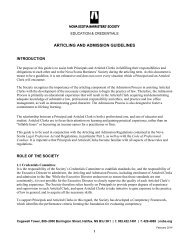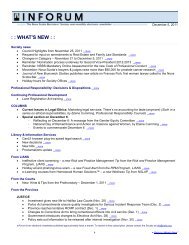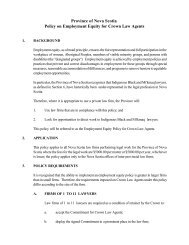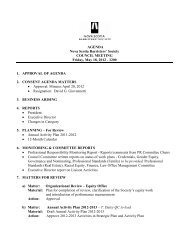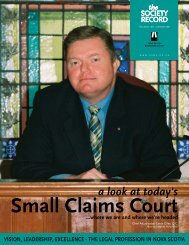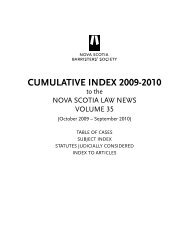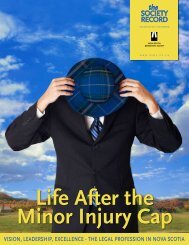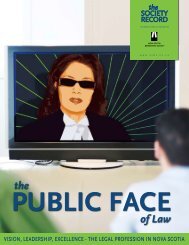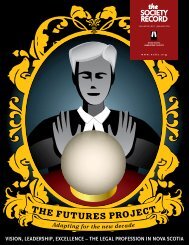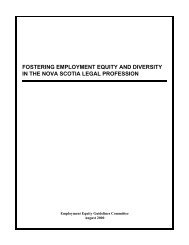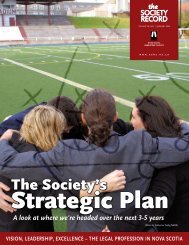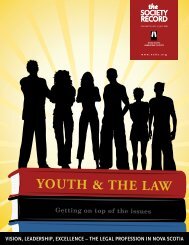SR Vol 27 No 4, October 2009 - Nova Scotia Barristers' Society
SR Vol 27 No 4, October 2009 - Nova Scotia Barristers' Society
SR Vol 27 No 4, October 2009 - Nova Scotia Barristers' Society
- No tags were found...
Create successful ePaper yourself
Turn your PDF publications into a flip-book with our unique Google optimized e-Paper software.
The Marshall Inquiry was aWylie Spicer QCmulti-faceted undertaking.McInnes CooperMost prominent in the publicview were the public hearings into theevents giving rise to the murder of Sandy Seale. Unbeknownst tomost people, there was also a very significant research component tothe Inquiry. Much of the effort of the hearings and of the researchwere directed to exploring how such a grievous mistake could havetaken place in a justice system that wehad thought was designed to preventsuch happenings.The Marshall Inquiry Report was thefirst in Canada to publicly and aggressivelyindicate flaws in the administrationof justice. Junior Marshall wasAboriginal and, as a consequence, wasmarginalized by the justice system.As many of the other wrongful convictioncases in subsequent years demonstrated,marginalization of the alleged offender is a theme runningthrough the piece. To put it another way, Junior Marshall was powerless.The hearings and the investigations of the Marshall Inquirydemonstrated that the justice system was not well suited to properlyand fairly deal with the issues of the powerless and marginalizedpeople in our society.As lawyers working for the Marshall Inquiry, we always considered itour responsibility as counsel to investigate every avenue that mightbe of benefit to the Commission in getting to the core of what hadhappened to Junior Marshall. The Marshall Inquiry touched manynerves as we worked on our mandate. <strong>No</strong>t surprisingly, one of themore sensitive nerves was struck when the Inquiry asked to speakto the judges of the Appeal Court who had rendered the decision24 The <strong>Society</strong> Record“The Inquiry was a wake-up callthat was telling all of us in thejustice system that everyonewho gets involved in the systemneeds to be treated with an equalamount of respect. ”involving Junior Marshall. It was never our intention to inquire intothe reasons for the decision written by the Court. We were interestedin establishing the material that was before the Court as part ofthe “record.” There was some ambiguity in the information in thepossession of the inquiry as to what that “record” constituted. <strong>No</strong>t astep to be taken lightly and, indeed, only taken after obtaining legalopinions on the point to satisfy ourselves that the inquiries to bemade of the judges were appropriate.One of the most troubling aspects of my experience during the Inquirywas the reaction of some of my lawyer colleagues to our request. Therewere not a few lawyers who expressed the view that we had no right totake such a step and what an affront our behaviour was to the judiciary.The irony of that reaction from some of my colleagues was that, if anything,it reinforced the Commission’s determination to do our best toget to the heart of what had gone wrong in the Marshall case.Twenty years later, as I’m being asked to reflect on the Marshall Inquiry,I wonder how far we have come as a society in dealing with thoseof our citizens who have been marginalized. The Marshall Inquirydemonstrated that a young Aboriginal person did not get a fair shakefrom the criminal justice system. The Inquiry made recommendationsto try and change the institutional reasons why that injusticehad occurred. The Inquiry was a wake-up call that was telling all ofus in the justice system that everyone who gets involved in the systemneeds to be treated with an equal amount of respect. Unfortunately,many individuals come before the criminal justice system from a lifeof poverty, marginalization and broken families. Being involved inthe criminal justice system is a result and not a cause.The criminal justice system does its best to treat its participants withrespect. As the Marshall Inquiry pointed out, however, it is not alwaysthat easy to ignore the prejudices and attitudes that have developedover time towards the marginalizedand powerless in our society. Theseprejudices are what is called “systemic.”To me, that means that they are partof the system in which we live anddifficult to consciously put aside.The Marshall Inquiry investigationsmade it clear that this systemicmarginalization affected all branchesof the administration of criminaljustice. It is not too hard to identifysomeone who is a blatant racist but itis much more difficult to identify theunsaid and unseen factors that make a society racist. I learned fromthe investigations of the Marshall Inquiry that all of us must do thebest we can to not allow these unsaid and unseen factors to affect usin our privileged positions in the justice system.



